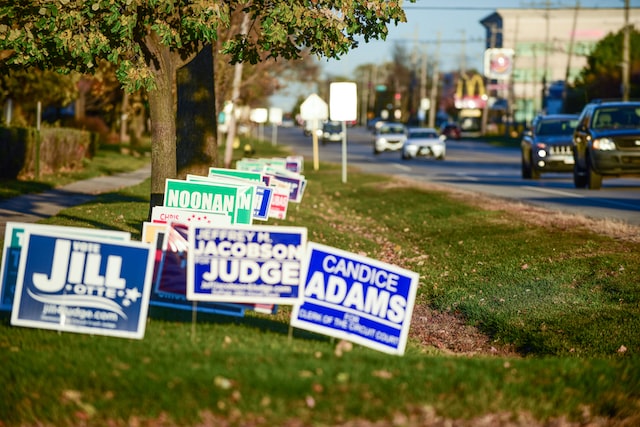Here’s yet another sign that your First Amendment rights are under attack by politicians – a ban on political signs.
Arizona State Senator Steve Kaiser proposed a bill to ban political signs from public property – streets, medians, and rights of way. But other signs, such as real estate open house signs, can stay.
That’s blatantly unconstitutional under the First Amendment. Government officials can’t pick and choose speech they do or don’t like. By targeting political speech, the legislation does not even try to pretend it is a legitimate use of state power.
Remarkably, Arizona politicians have tried these unconstitutional schemes before. In a unanimous 2015 Supreme Court case Reed v. Town of Gilbert, the Supreme Court struck down a Gilbert, Arizona law for treating religious services signs differently than other signs.
But this bill speaks to a broader impulse of many incumbents; they use their free speech rights to climb the ladder to political power and then yank those rights away so challengers can’t follow them. The proposal would surely benefit incumbents, like Steve Kaiser, who already benefit from name recognition and easier access to the media.
Research by political scientists demonstrates that name recognition is a powerful advantage for incumbents. Political speech, like signs in the median, help challengers overcome this disadvantage by getting their name in front of voters. Banning challengers from putting up campaign signs entrenches incumbents and the status quo. This is especially true for down-ballot races where campaigns have less publicity and challengers often have fewer financial resources.
Of course when Steve Kaiser campaigned last year, he put signs up to share messages that helped elect him. However, now that he has secured political power, he wants to strip candidates who want to challenge him of the First Amendment rights that he enjoyed.
Kaiser offers two arguments for his legislation. First, he says that the signs can distract motorists, people don’t like them, they can be defaced, and they create trash. These are reasons to ban all signs, not just political ones. Even so, we should always tolerate a bit of messiness in the world so that we can speak our minds on political issues. You could, after all, make similar arguments about other rights – voting leads to litter near polling places, signs at mosques and synagogues can be targeted for defacement, and no one likes watching political ads on TV – but these are not good reasons to ban the exercise of fundamental rights.
Kaiser further argues that his legislation would hurt incumbents because they can afford more signs. But incumbents can typically afford more of everything, such as expensive mailings and digital ads. Signs are relatively cheap and one of the few areas where challengers can help level the playing field with incumbents. But even if Kaiser is right, laws that ban political speech in order to harm incumbents would also violate the First Amendment. The First Amendment doesn’t allow lawmakers to choose between banning incumbent and challenger political speech. It protects free speech for all.
If Kaiser’s bill passes and is challenged in court, it will be almost certainly be struck down. Taxpayers will pay twice for this attack on our rights. First by paying government attorneys to defend the indefensible. And again by paying attorney’s fees to the plaintiff who filed the lawsuit.
Unfortunately, the bill is another troubling reminder that we often cannot trust politicians to uphold the oaths they swear to defend the Constitution, including free speech.
To push back, Arizonans can exercise their own speech rights, while they still have them, by erecting billboards of their own saying how terrible Kaiser’s bill is.














